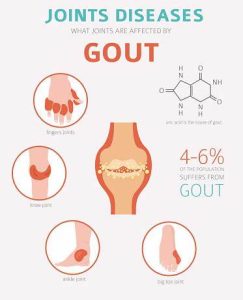Gout is a form of inflammatory arthritis that can cause sudden and intense attacks of joint pain. It often affects the big toe, especially at night, but can also strike other joints like the ankles, smaller toes, and knees. Here are some key points about gout:

Symptoms of Gout:
- Sudden, intense pain: Gout attacks typically come on suddenly, often in the middle of the night.
- Localized swelling: The affected joint becomes swollen.
- Redness and warmth: The joint may feel hot and appear red.
- Hypersensitivity: The area around the affected joint becomes hypersensitive.
Causes of Gout:
- Gout occurs due to an accumulation of uric acid crystals in the joints. Uric acid is a byproduct formed when the body metabolizes purines (which occur naturally in cells and certain foods).
- High levels of uric acid lead to the formation of microscopic needle-like crystals (monosodium urate) that irritate the affected area and cause gout symptoms.
Risk Factors for Gout:
- Diet: Consuming foods high in purines increases the risk.
- Medical conditions: Hypertension, diabetes, congestive heart failure, psoriasis, and obesity are associated with gout.
- Gender and age: Men over 40 are more susceptible.
- Alcohol and fructose: Excessive alcohol consumption and fructose-containing foods contribute.
- Diuretic medication: Taking water pills increases the risk.
- Family history: A genetic predisposition may play a role.
Why Gout Often Begins in the Foot:
- Uric acid crystallizes more readily in colder areas of the body.
- The foot, being farthest from the heart, tends to be cooler, making it a common site for gout attacks.
Remember to seek medical advice if you suspect you have gout or experience symptoms. Proper management and lifestyle changes can help prevent flare-ups and improve overall well-being.



